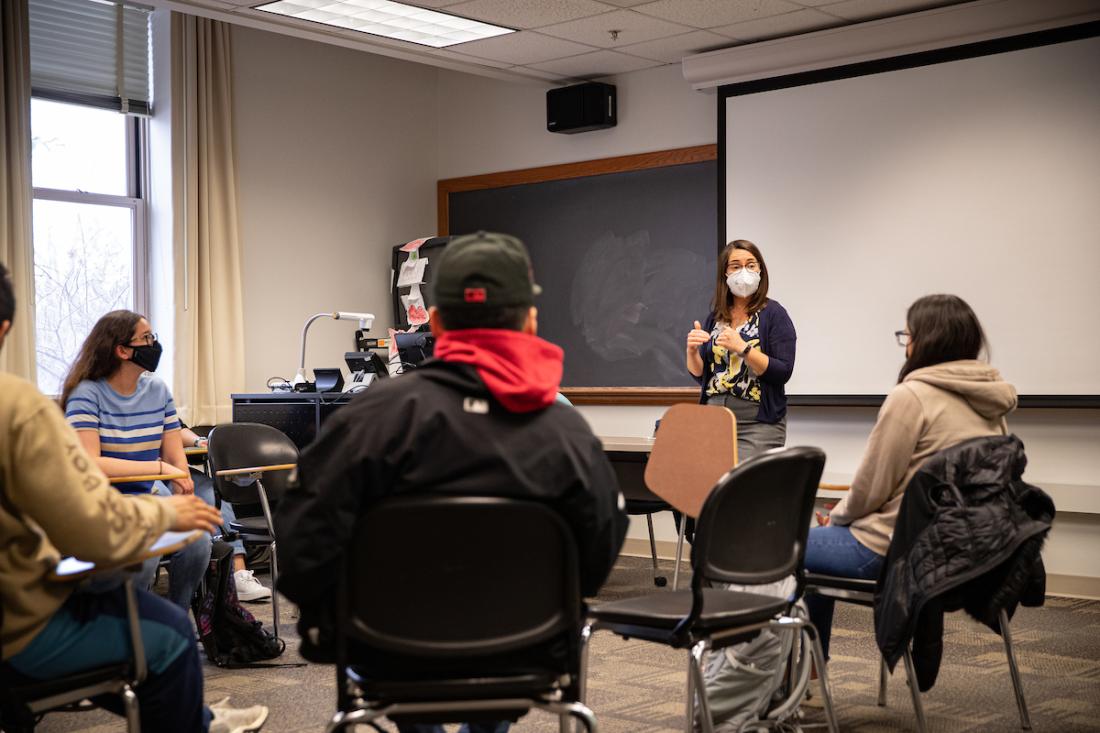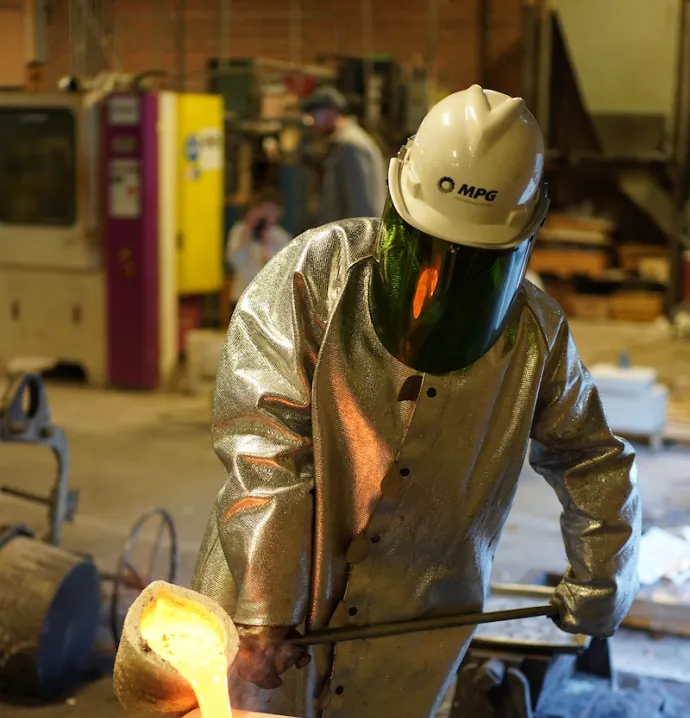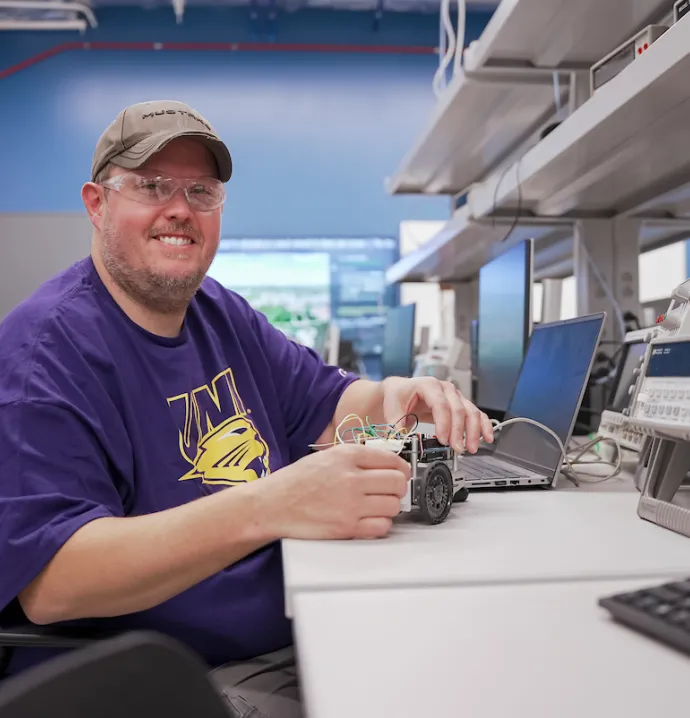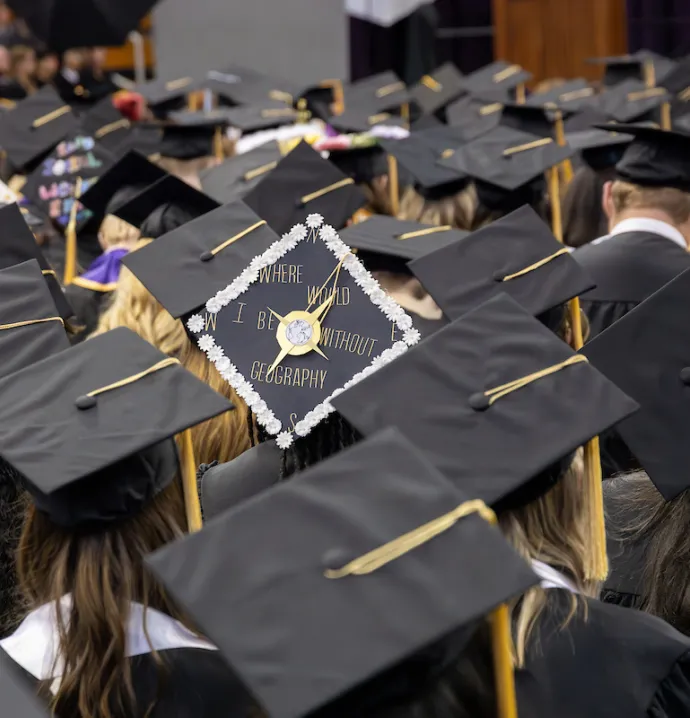Students find community in class created for heritage Spanish speakers
Students find community in class created for heritage Spanish speakers

Heritage Spanish-speaking students at the University of Northern Iowa have found a special community on campus—not in the form of a student organization or a one-off campus event, but in a class created by Associate Professor of Spanish Linguistics Juan Carlos Castillo.
The Spanish for Heritage Speakers class was designed for students who spoke Spanish with their families growing up but have not had the opportunity to study the language. Whether Castillo or Elise DuBord (another professor of Spanish linguistics) is teaching the class for the semester, the instructor will only lecture in Spanish. The students exclusively speak Spanish as they participate in group discussions, complete assigned readings and give presentations. While the focus of the class is deepening the students’ knowledge of the language, topics like culture and immigration are woven throughout the coursework.
“I think it's so sad when people lose their culture and their identity,” Castillo explained. “I think that there are already plenty of monolingual people in this country. So, for that small population that's bilingual and bi-cultural, I think that we need to preserve that.”
As a native Spanish speaker, Castillo understands the importance of preserving his bi-cultural identity. He was born in Bilbao, Spain, and lived there through his college years. Upon earning his undergraduate degree from Universidad de Deusto, Castillo moved to the U.S. where he added two master’s degrees from the University of Iowa and a PhD from the University of Maryland to his resume. While he makes trips to Spain as often as he can, he has always worked as a professor in the U.S., first at the University of Iowa and at UNI since 2001.
Castillo’s idea for a Spanish heritage class arose from interactions with students who grew up speaking Spanish with their families but still needed some help when it came to reading, writing, and grammar. However, for a long time, there wasn’t necessarily enough of a student population at UNI to create a demand for the class until around 2010, when Castillo says the first generation of Iowa Latinos hit college age.
While Castillo says the first class was taught as an “experiment,” it was clearly a very successful one, as the class is still going on 10 years later.
“For people that in many cases have faced discrimination or who many times have been put down in public for speaking a language other than English — to have a class that's specifically for them and where they actually meet a lot of people that have the same experience as them, really helps build a sense of community,” he said.
Castillo said that many of the students decide to add a Spanish major or minor. One such student is Martha Ortiz Diaz, who is pursuing her master's degree in social work at UNI after receiving her undergraduate degree in Spanish and social work here at the university.
“I feel like if I would have known how much of an asset Spanish was as a child, I probably would have dedicated myself a lot more to the language,” Ortiz Diaz said. “I just never thought about it until college when I realized I really liked Spanish and I felt like I was losing it.”
While the Marshalltown native’s parents are both from Mexico, her father is verbally bilingual and her mother primarily spoke Spanish when Ortiz Diaz was growing up. Ortiz Diaz said she didn’t realize how much Spanish reading and writing she lacked until she took a trip with her family to Mexico at age 18. She walked away from the trip thinking she was “basically illiterate.”
Finding the Spanish heritage class as an undergraduate student was crucial to rekindle Ortiz Diaz’s love of Spanish and improve her confidence in her Spanish-speaking abilities.
“I’ve never seen my Spanish improve so much in a semester,” she said. “I’m able to go to Mexico now without getting second looks because not only do I look Hispanic but now my Spanish matches it.”
Ortiz Diaz said the class has helped her grow closer to her family as she can more confidently message relatives on Facebook without second-guessing her communication. This has also helped her get more connected with her culture.
On a professional level, Ortiz Diaz is also excited to see how her improved Spanish will impact her as a social worker, especially since she wants to work on destigmatizing conversations about mental health in the Latinx community.
While Ortiz Diaz’s experiences before taking the Spanish heritage class are pretty common, there are some outliers who took a slightly a different path to get to the course. One such example is Elian Cordova, who, unlike most of his classmates, actually lived in Mexico from the age of six until he was 16.
The sophomore who is majoring in criminology was born in Illinois to two Spanish-speaking parents. When Cordova was six, his family went to Mexico for what was supposed to be a temporary relocation to care for an ailing relative, but a decade later, they were still in Mexico.
Unfortunately, because Cordova was born in Illinois, he was unable to attend a Mexican high school, so he moved back to the U.S., this time to Orange City, Iowa, where an uncle of his lived. As his environment has changed over the years, so has Cordova’s fluency in both English and Spanish.
After high school, Cordova followed his girlfriend to UNI, where he connected with his resident advisor, Nixson Benitez. He learned about the Spanish heritage class because Benitez had already completed it.
“We connected because he found out that I spoke Spanish,” Cordova said, “We would go get coffee once in a while and speak in Spanish because he wasn't used to a lot of people here knowing the language.”
Cordova was drawn to the class in part because of the opportunity it would provide to speak to more people in Spanish. He was used to primarily speaking in Spanish with family members, as well as a childhood friend from Mexico whom he would talk to virtually while gaming.
While the class has helped him polish up on punctuation and accents, Cordova said he also enjoys being in the class to help others since he has more experience with Spanish than his average classmate.
In the future, this could be a skill that Cordova sharpens even further if he wishes, as Castillo hopes to expand the Spanish heritage program by adding another course with a focus on translation for heritage speakers. While they are just in the planning phase currently, he has hopes that it will be offered in spring 2023 and then become part of a regular rotation where students take one class in the fall and the other in the spring.




